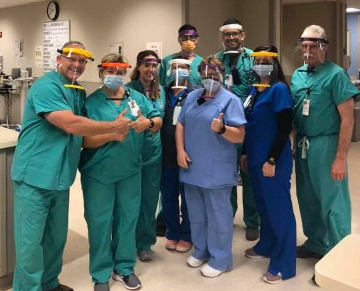High School Students Engineer Covid-19 Gear
It seemed like a simple request at the time. Lake Regional Hospital in Osage Beach, Missouri, needed 150 face shields to protect people caring for coronavirus patients, and robotics students at nearby Camdenton High School rushed to help.
Soon, they were fielding requests from first responders, dentist offices, and even U.S. troops stationed in Afghanistan. Unfazed, the students rose to the challenge. Their secret supply source: 3-D printers that the local middle school had received as part of a $16 million grant from the University of Missouri College of Education.
“To see the face shields being used by medical professionals is encouraging and the reaction has been super positive,” says Zane Foulk, a Camdenton High School senior and member of its FIRST Robotics team. “We have been making roughly 40 face shields a day and will keep going until we run out of material or the hospitals get what they need.”
Launched in 2018, the Enhancing Missouri’s Instructional Networked Teaching Strategies (eMINTS) program trains middle school teachers to incorporate technology, such as 3-D printing, into their classrooms. eMINTS program coordinator Michelle Kendrick collaborated with Johannes Strobel, a professor in the College of Education, to partner with 27 middle schools throughout rural Missouri and Kansas.
Strobel has been working with 16 3-D printers in the College of Education to prototype new designs and produce face shields locally for MU Health Care, Boone Hospital and nursing homes. He and Kendrick are working with the Department of Education to share the 3-D printing experiences in Camdenton with other eMINTS partner middle schools. They also are developing curriculum for middle school teachers that highlight the coronavirus pandemic response in relation to its impact on science, technology, engineering and math (STEM), as well as skills like problem-solving, teamwork and empathy.
“By tying this health crisis into the students’ curriculum, they are able to see that the work they are doing with 3-D printers is having an immediate and direct impact on a real-world situation,” says Kendrick. “In addition to sparking interest in science and making schoolwork more engaging, we hope this experience teaches young students about empathy by asking them to consider the needs of health care workers and the sacrifices they have made to protect us all.”
Adds Strobel: “We are teaching students that they are not just consumers of new technologies, but they can use it to produce something that is helpful and can save lives.”
Read the University of Missouri news story from which this eGFI Teachers blog post was adapted.
Filed under: K-12 Education News, K-12 Outreach Programs, Special Features
Tags: 3-D printing, Biomedical Engineering, coronavirus, Covid-19 protective gear, Curriculum, middle school technology integration, STEM education, University of Missouri College of Education eMINTS program









